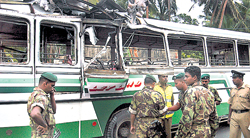
|
Agreeing on need to end violence, disagreeing on how
Amidst speculation that several UNP MPs are waiting in the wings to join the government, Parliament met for the first time this year on Tuesday but much of what was discussed left little room for optimism that this year would be any different from the preceding one. The tough new emergency regulations introduced by the government in December to crack down on terrorist activities did not seem to have made much of a dent in the incidents of violence, as was illustrated when Prime Minister Ratnasiri Wickremanayake presented in Parliament the grim statistics of the death toll in the country for the month (year) ending January 9. Fifty nine security personnel and 79 civilians had died and more than 300 wounded due to terrorists attacks, the Prime Minister said moving the motion to extend the state of emergency for another month.
The recent bus bombings figured prominently when the Prime Minister explained to the House the acts of violence and said the emergency was needed to assist the security forces to curb such attacks. The emergency regulations were passed with the support of all parties in Parliament except the Tamil National Alliance (TNA) even though some UNP members were not happy with the manner in which the emergency was being used to curtail civil liberties. Kurunegala district MP Dayasiri Jayasekara particularly mentioned the attack on members of an anti war front movement on Wednesday, a few hours before they were to hold a meeting at Nugegoda. But despite their reservations, the UNP too supported the motion along with the JVP and JHU. An adjournment motion on the situation in the north and east moved by TNA Parliamentary group leader R.Sampanthan was taken up on Wednesday but the issue of the de-merger figured high during this discussion. In a lengthy submission in the House, Mr.Sampanthan said when TNA MPs met Indian Prime Minister Manmohan Singh in December, they told him that the merger of the north-east was the corner stone of the peace process, and that it would crumble unless the merger was sustained and the Indian leader was in agreement with this view. The TNA leader also warned against a referendum or electoral process in the present situation in the north – east saying it would be ‘illegal, fraudulent and undemocratic.’ “We would strongly urge the government not to allow itself to be goaded by some of its alliance partners and take actions that would be against the long term interests of the country. We strongly submit that the government should not make the judgement of the Supreme court, an excuse for embarking on a course of action fraught with harmful consequence,” Mr.Sampanthan said. He said the Court merely stated that certain steps taken to merge the two provinces by the former President J.R.Jayewardene were defective and therefore invalid and said it was obligatory on the part of the government to rectify that defect. “If the government does not do so it can only mean that the government is using the judgement of the court as an excuse to avoid fulfilling its obligation,” he said. JHU Parliamentary group leader Ven. Aturaliye Ratana Thera said his party would never allow anyone to merge the two provinces and asked the UNP to state its position on the issue. He said the UNP has stated outside the Legislature that it would support a Bill to merge the two provinces if brought to Parliament, but that no such announcement has been made in Parliament. There was no word from neither government nor UNP speakers on what exactly their stand on the merger issue was. However, Kandy district UNP MP Lakshman Kiriella said bringing bills to Parliament was the responsibility of the government and they should not delegate its duty to the Supreme Court. Mr.Kiriella made specific reference to last September’s Supreme Court ruling that the Sri Lankan state’s accession to the Optional Protocol to the International Covenant on Civil and Political Rights (ICCPR), which allows individuals to complain directly to the Human Rights Commission having exhausted domestic avenues was unconstitutional. The UNP MP was speaking mostly to empty government benches. Minister Felix Perera who spoke on behalf of the government emphasised the importance of bringing peace to the country and said it is time for the LTTE to make a genuine attempt to join the peace proves. JVP Parliamentary group leader Wimal Weerawansa made two special statements in Parliament. In one, on Tuesday, he urged the government to abrogate the Ceasefire agreement (CFA) before it completes five years next month. In another statement on Thursday he said that the proposals submitted to the All Party Representatives Committee (APRCV) by its Chairman Tissa Vitarana were “dangerous” and should not form the basis for the solution to the ethnic problem. In response Leader of the House Nimal Siripala De Silva said the government would consult all parties when a final solution is worked out and said that the APRC proposals were not the government’s final proposals. Parliament also passed a vote of condolence on two former TNA MPs S. Chandra Nehru and Nadaraja Raviraj, both of whom met with violent deaths. Unfortunately, many of the MPs deviated from the customary condolence speeches and made political speeches but what they all agreed on was the need to end the spiralling violence. |
|| Front
Page | News | Editorial | Columns | Sports | Plus | Financial
Times | International | Mirror | TV
Times | Funday
Times || |
| |
Copyright
2007 Wijeya
Newspapers Ltd.Colombo. Sri Lanka. |
